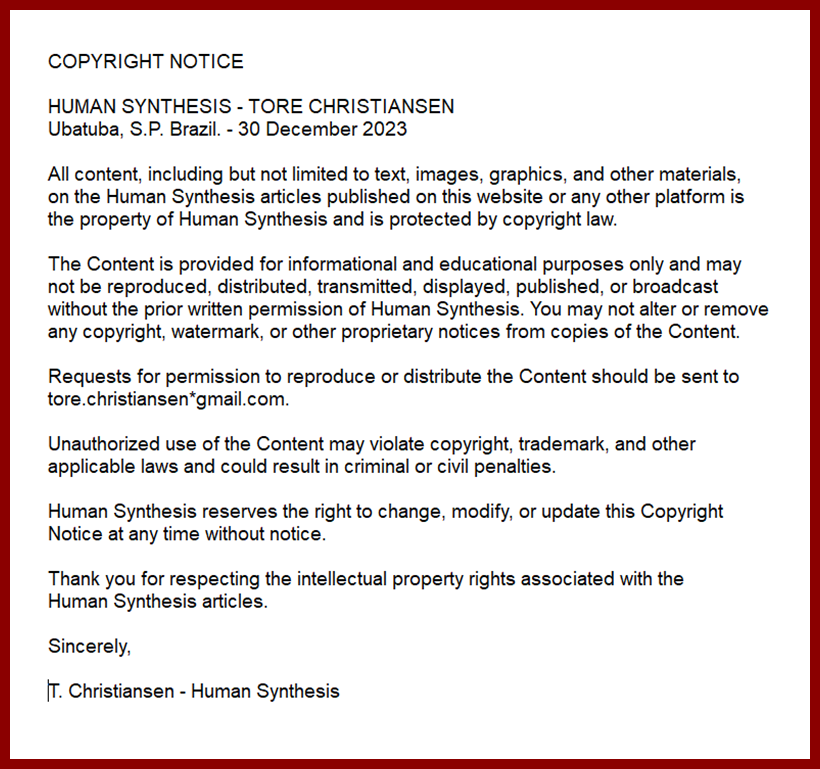US to ‘have contact’ with Russia today, says Rubio, after Ukraine agrees to 30-day ceasefire – Europe live
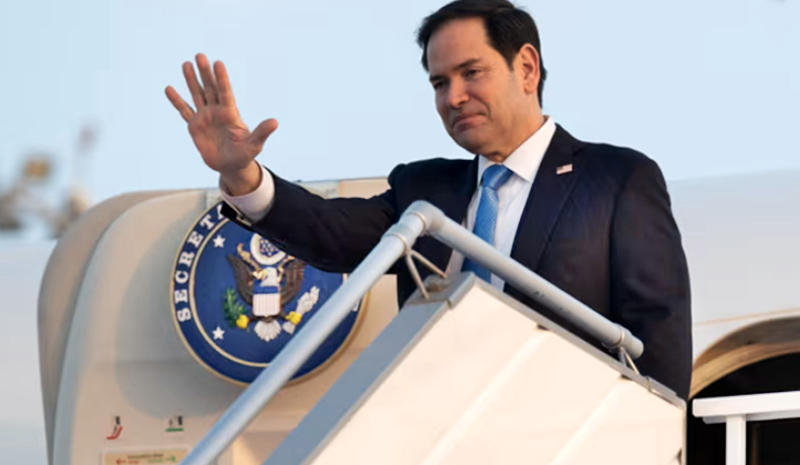
By Guardian- Jakub Krupa/Helen Sullivan-Wed 12 Mar 2025 12.55
Rubio's comments after talks with Ukraine - summary. US state secretary Marco Rubio told reporters that a sufficient deterrent to keep Ukraine safe from future aggression would “have to be a part of the conversation” if the US-led peace process gets to the next stage and formal negotiations with Russia. US secretary of state says he ‘strong urges Russia to end all hostilities.
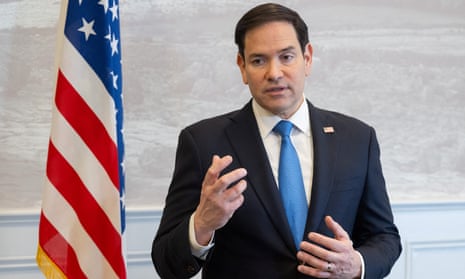
Speaking to reporters at Shannon Airport in Ireland, where he briefly stopped for refuelling on the way back to the US, Rubio also said that Europeans are likely to have a role to play as he “would imagine” that Russians would raise the issue of EU sanctions on Russian economy as something they want removed as part of the talks.
Rubio also said the US-Ukraine minerals deal would not form a direct security guarantee for Ukraine, but he said that the US “would have a vested interest in protecting it if it were to be challenged or threatened.”
He said the US administration was “happy” that Ukraine backed the process, and the focus was now on Russia’s answer. He expected the US to “have contact” with Russia on Wednesday.
“If they say no, it’ll tell us a lot about what their goals are and what their mindset is, but I don’t want to go into that before they’ve even answered us,” he said.
Below are longer excerpts from his comments:
- On Ukraine and deterrence:
Can Ukraine create a sufficient deterrent against future aggression, against future attack, against future invasion? Because every country in the world has a right to defend themselves, and no one can dispute that, so that will most certainly have to be part of the conversation.
There isn’t a peace to secure until you have a peace. But there’s no way to have a enduring peace without the deterrence peace being a part of it.
- On European involvement and sanctions:
The Europeans have issued a series of sanctions against the Russian Federation, and I would imagine that in any negotiation, if we get there, hopefully with the Russians, they will raise these European sanctions that have been imposed upon them.
So I think that the issue of European sanctions is going to be on the table, not to mention what happens with the frozen assets and the like.
So I think it’s self evident that for there to be a peace in Ukraine at the end of that process, there’s going to have to be some decision made by the Europeans about what they’re going to do with these sanctions and so forth. And so that’s why, I think they have to be necessarily involved in this regard.
Whether they’re involved at the front end of it or at the back end of it, it’ll have to play itself out.
And then obviously there’s also all sorts of security promises that European countries have made to Ukraine that that will also be, I imagine, a part of this conversation as we move forward.
- On the prospect of European troops in Ukraine
There’s different ways to there’s different ways to construct a deterrent on the ground that prevents another war from starting in the future.
We’re not going to go in with any sort of preconceived notion.
The bottom line is it needs to be something that makes Ukraine feel as if they can deter and prevent a future invasion, how that looks and how that’s put together. That’s what we’re going to be talking about if we can get to that stage again.
Right now, we’re just trying to get to the stage where there’s actual diplomacy happening.
- On US-Ukraine minerals deal
I think that a minerals deal is something that I think is beneficial for both countries. …
So I think certainly any economic development for Ukraine is positive for their own future. Obviously, the United States [also] has a vested economic interest … we’re tied to them on an economic front. We’re in partnership with them on something. We will have an interest in the future of Ukraine as well.
I wouldn’t couch it as a security guarantee, but certainly, if the United States has a vested economic interest that’s generating revenue for our people as well as for the people of Ukraine, we’d have a vested interest in protecting it if it were to be challenged or threatened.
- On monitoring any potential ceasefire
The interesting thing about modern warfare is there it’s easier than ever to monitor. And simply because there’s so many eyes on the ground, and there’s also all sorts of overhead, you know, commercial satellite and the like.
It would be pretty hard to hide drone strikes. It would be hard to hide missile strikes, ballistic strikes, artillery.
So we feel like that is something that could be monitored. …
If [Russians] say yes, one of the things we’ll have to determine is who do both sides trust to be on the ground to sort of monitor some of the small arms fires and exchanges that could happen, but those are practices that that have become common in these and I don’t think that would be difficult to set up.
- On US approach to Russia
The United States has not provided armaments to Russia. The United States is not providing assistance to Russia. Every single sanction that has been imposed on Russia remains in place. …
They’re pretty sanctioned up. …
My point being is that we’ve, there’s been no steps taken to relieve any of these things.
These things continue to be in place, but we don’t think it’s constructive for me to stand here today and begin to issue threats about what we’re going to do if Russia says no. Let’s hope they say yes.
- On next steps
We are happy that the Ukrainians have agreed to do so; now it is up to Russia to say yes. If Russia says yes, that’s very good news, and we will begin that process and do everything we can to move that process forward.
If they say no, then obviously we’ll have to examine everything and sort of figure out where we stand in the world and what their true intentions are.
If they say no, it’ll tell us a lot about what their goals are and what their mindset is, but I don’t want to go into that before they’ve even answered us. …
They expressed a willingness under the right circumstances, which they did not define, to bring an end to this conflict.
So we have Ukraine ready to come to the table. Now we need to get Russia to come to the table.
If they do, and the shooting stops, I think that’s a very good day in the world.
Obviously, no one here is pretending that that negotiation is going to be easy or fast or simple, but at least we’ve gotten to that point.
If their answer is no, then obviously we’ll have to deal with that, and we’ll have to, at that point, make decisions on that basis.
We’re not there yet. Hopefully the answer is yes.
ShareUpdated at 12.55 GMT1h ago11.50 GMT
We’re getting more lines from Rubio.
In comments that will be welcomed in Kyiv, he also added that Ukraine needs sufficient deterrent against future attacks.
And he also said that Europeans will “need to be involved in this regard,” Reuters reported.
On a less positive note, he said he “would not couch minerals deal as a security guarantee,” but AFP added he said it would give the US “a vested interest” in Ukraine’s security.
ShareUpdated at 11.55 GMT
US to 'have contact' with Russia today, Rubio says
US state secretary Marco Rubio has said that the US “will have contact with Russians” today.
He said the US hoped to have a positive answer from Russia, and “strongly urge Russians to end all hostilities.”
“There is no military solution to this conflict,” he said.
Rubio also confirmed that Tuesday’s talks in Jeddah, Saudi Arabia, covered “what a negotiation process would look like,” and included “conversations about territorial concessions.”
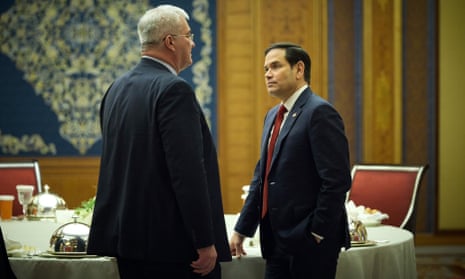
ShareUpdated at 11.48 GMT1h ago11.35 GMT
What's next for US-led ceasefire plan - snap analysis

Dan Sabbagh
Defence and security editor
The Kremlin said it was waiting for the US to inform it about a proposed ceasefire in Ukraine and what this could mean for broader peace talks.
But there is a bit of scepticism in Kyiv that Russia could be genuinely interested in the offer, as it appears to be determined to continue its aggression against Ukraine.
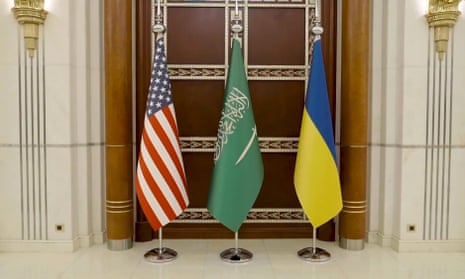
A Ukrainian analyst I spoke with expected Vladimir Putin to wheel out some of the classic maximalist Russian demands on Ukraine to make further progress as difficult as possible.
These could include a demand to hold fresh presidential elections as Russia continue to question the legitimacy of Volodymyr Zelenskyy and a request to stop military aid deliveries to Ukraine.
They thought that such a response could also include a call for an extensive buffer zone around Ukrainian borders, and that’s after taking away four regions of Ukraine that it already considers Russian, a claim rejected by Ukraine.
Russia is also likely to ask that the Ukrainian army cut numbers - claiming that it is needed to limit its offensive potential and not pose a threat to Russia – and forcefully oppose any suggestions of peacekeeping forces formed by Nato or any other group of nations.
“But the ball is in [their court],” the analyst said.
For what it is worth, a senior source in the Russian administration told Reuters on Wednesday that “it is diffiącult for Putin to agree to this in its current form,” claiming that Russia “has a strong position because [it] is advancing.”
Share2h ago10.53 GMT
Four dead after Ukrainian attack in Kursk
A Ukrainian attack on a factory in Russia’s Kursk region killed four people, Russia said, as its troops reclaim territory from Kyiv’s forces in the border area.
“Four employees of the company were killed, among them three men and one woman,” acting governor Alexander Khinshtein said on social media, adding that the attack hit an agricultural plant in the village of Kozyrevka, east of where fierce fighting between Moscow and Kyiv’s forces is under way, AFP reported.
Share3h ago09.57 GMT
Kremlin waits for US to update it on Ukraine talks
The Kremlin said it was waiting for the US to inform it on the proposals discussed with Ukraine on Tuesday.
“We assume that state secretary [Marco] Rubio and [national security] adviser [Michael] Waltz through various channels in the coming days will inform us on the negotiations that took place and the understandings reached,” Kremlin spokesperson Dmitry Peskov said, adding Moscow did not rule out a “high-level” phone call with the US.
He also said that the Russian army was making good progress in its drive to drive Ukrainian troops from the Kursk border region, Reuters reported.
“The information provided by our military shows that our troops are successfully advancing in the Kursk Region, liberating areas that were under the control of the militants. The dynamic is good,” Peskov told reporters.
Share4h ago09.01 GMT
'Now it's up to Putin,' Germany's Scholz says

Outgoing German chancellor Olaf Scholz welcomed Wednesday Ukraine’s backing for a US-proposed 30-day ceasefire plan, saying the decision on the next steps now rested with Russian President Vladimir Putin.
“The idea of a 30-day ceasefire is an important and correct step towards a just peace for Ukraine... Now it’s up to Putin,” Scholz said on social media platform X.
The outcome of the Jeddah talks was also welcomed by Spanish prime minister Pedro Sánchez, who said the ceasefire proposal was positive news.
Share5h ago08.16 GMT
US aid deliveries to Ukraine back to previous levels, Polish foreign minister confirms
Polish foreign minister Radosław Sikorski has just confirmed that US aid deliveries to Ukraine coming through the Polish logistics hub in Rzeszów-Jasionka have returned to previous levels seen before the brief pause.
Sikorski spoke at a press conference alongside his Ukrainian counterpart Andryi Sybiha, who stopped in Poland on his way back from Jeddah.
Sybiha, speaking in Polish, said that Ukraine was “the country that wants to end this war, and [achieve] a just, lasting peace the most.”
He added that Ukraine was ready to form a negotiating team to work on a roadmap to reach ceasefire with Russia.
Last night, US and Ukraine leaders agreed on resuming the aid deliveries and intelligence sharing as part of a broader peace.
In a cheeky comment just days after he publicly clashed with US state secretary Marco Rubio and Trump aide Elon Musk over the technology, Sikorski also added that “Starlinks are also still working.”
Tusk calls for respect between allies after US-Poland spat over Starlink satellitesRead moreShareUpdated at 08.16 GMT5h ago08.06 GMT
EU strikes back against Trump's tariffs
Donald Trump’s tariffs on steel and aluminium imports took effect on Wednesday “with no exceptions or exemptions”, as his campaign to reorder global trade norms in favour of the US stepped up.
The US president’s action to bulk up protections for American steel and aluminium producers placed tariffs of 25% on all imports of the metals.
Trump tariffs on steel and aluminum come into effect amid US-Canada trade warRead more
The European Commission responded almost immediately, saying it would impose counter tariffs on €26n ($28bn) worth of US goods from next month.
“We deeply regret this measure,” European Commission chief Ursula von der Leyen said in a written statement, as Brussels announced it would be “launching a series of countermeasures” in response to the “unjustified trade restrictions”.
EU retaliates against Trump tariffs with €26bn ‘countermeasures’Read more
Speaking in Strasbourg in the last hour, von der Leyen added that “jobs are at stake, prices up” as a result of Trump’s move.
“Nobody needs that on both sides, neither in the European Union, nor in the United States,” she argued.
EU countermeasures will be introduced in two steps, she said, starting from 1 April, and fully in place from 13 April.
“In the meantime, we will always remain open to negotiations. We firmly believe that in a world fraught with geoeconomic and political uncertainties, it is not in our common interest to burden our economies with such tariffs,” she said.
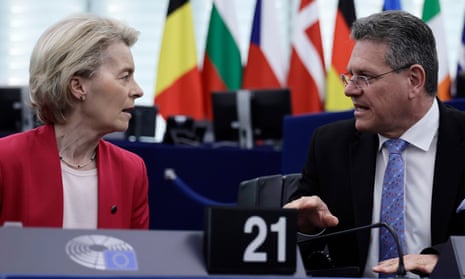
EU trade commissioner Maroš Šefčovič said the US measures “take us in a wrong direction,” as he said that during his visit to Washington last month “it was clear that the EU is not the problem, making today’s measures even more unjustified.”
“The disruption caused by tariffs is avoidable if the US administration accepts our extended hand and works with us to strike a deal,” he said.
For full coverage of the business fallout, follow our special live blog here:
Trump tariffs of 25% on steel and aluminium come into effect globally as Europe says it will retaliate – business liveRead moreShare5h ago07.40 GMT
Morning opening: Ball in Russia's court

Jakub Krupa
When Andriy Yermak, top official in the Ukrainian president Volodymyr Zelenskyy’s office, posted a handshake emoji halfway through yesterday’s meeting on social media, it became clear that the US-Ukraine talks were going in the right direction.

Or, as our defence and security editor Dan Sabbagh described it: “Dizzying turnaround in US-Ukraine relations leaves all eyes on Russia.”
Now, for the first time, Russia is being asked to make a commitment, though it is unclear what will follow if it does sign up.
Dizzying turnaround in US-Ukraine relations leaves all eyes on RussiaRead more
The US intends to speak to Russia in the next 24-48 hours to get an early indication as to whether Putin is willing to agree to Trump’s plan on ceasefire. If so, this could lead to proper peace talks, including all sorts of potentially contentious issues on future security guarantees for Ukraine.
Marco Rubio, the US secretary of state, said the ball was “now in Russia’s court” after the negotiations concluded. “If they [Russia] say no then we’ll unfortunately know what the impediment is to peace here,” he said.
(One could argue there are some other hints about that too, but hey.)
Let’s see what’s the aftermath of the Jeddah talks, and what’s next for Ukraine.
Ukrainian foreign minister Andrii Sybiha, who took part in yesterday’s talks, is in Warsaw this morning, and expected to speak to the media in the next half hour. I will bring you all the key lines.
Later today, defence ministers of France, Germany, UK, Italy and Poland are meeting in Paris as part of discussions about Europe’s response to peace talks and potential Europe-led security guarantee for Ukraine.
Separately, I will also keep you up to date on:
- the overnight surprising results in Greenland’s ‘most consequential’ elections,
- the European Union’s response to Trump’s tariffs,
- and what’s next for Portugal after the government in Lisbon lost a vote of confidence last night, paving the way for snap elections.
It’s Wednesday, 12 March 2025, and this is Europe live. It’s Jakub Krupa here.
Good morning.
The Guardian’s Rafael Behr writes in this opinion piece that a Trump-Putin pact is emerging, and that its target is Europe:
A prime time current affairs programme; a discussion about Donald Trump’s handling of the war in Ukraine. “He’s doing excellent things,” says a firebrand politician on the panel, before listing White House actions that have belittled Volodymyr Zelenskyy and weakened his battlefield position – military aid suspended; satellite communications obstructed; intelligence withheld. “Do we support this?” It is a rhetorical question.
“We support it all. Absolutely,” the celebrity host responds. “We are thrilled by everything Trump is doing.”
Such approval might not be out of place on polemical rightwing channels in the US, but these exchanges weren’t broadcast to American audiences. The show’s anchor is Olga Skabeyeva, one of Vladimir Putin’s most dependable propagandists. To hear the highest pitch of praise for Trump’s bullying of Ukraine you need to watch Russia’s state-controlled Channel One.
This being a Kremlin script, the enthusiasm was soon leavened with suspicion. For now the pressure on Kyiv is great, Skabeyeva continued, but what will the Americans want in return?

Russian intelligence chief holds call with CIA director
Russia’s foreign intelligence chief, Sergei Naryshkin, held a phone call on Tuesday with the director of the US Central Intelligence Agency, John Ratcliffe, the Interfax news agency reported on Wednesday.
They discussed issues of cooperation between their respective intelligence agencies and crisis management.
Two killed in Russian attack on Kryvyi Rih
A Russian missile attack on Kryvyi Rih killed a 47-year-old woman and caused a fire at an infrastructure facility, Dnirpopetrovsk regional governor, Serhiy Lysak, said on Wednesday.
The attack also injured at least two other people, local official Oleksandr Vilkul said in a statement on the Telegram messaging app.
Russian foreign minister says 'under no conditions' will Moscow accept Nato troops in Ukraine
Russia’s foreign minister, Sergei Lavrov, says Moscow will under no conditions accept the presence of Nato troops in Ukraine.
In an interview published in Russian media, he also said that Russia would not make decisions that jeopardise lives, Reuters reports, and that Russia discussed the situation around Iran’s nuclear deal with the US and maintains some contact on the issue with Europe.
Russia is open to Trump’s idea of meeting with China, he added.
What is the ceasefire agreement?
Ukraine expressed readiness to accept the US proposal to enact an immediate, interim 30-day ceasefire, which can be extended by mutual agreement of the parties, a joint statement says.
Zelenskyy said in his nightly video address that the US proposed taking a full interim ceasefire, stopping missile, drone, and bomb attacks, not only in the Black Sea, but also along the entire frontline.
“Ukraine is ready to accept this proposal – we see it as a positive step and are ready to take it,” Zelenskyy said.
The United States said it would immediately lift the pause on intelligence sharing and resume security assistance to Ukraine, Reuters reports. Ukrainian officials said late on Tuesday that both aid and intelligence sharing have resumed.
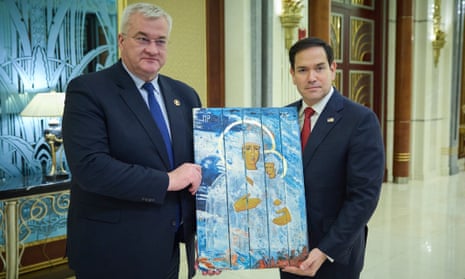
In Tuesday’s joint statement, the two countries said they agreed to conclude as soon as possible a comprehensive agreement for developing Ukraine’s critical mineral resources.
The minerals agreement has been in works for weeks and was thrown into limbo after an acrimonious White House meeting on 28 February between the US President Donald Trump, who has long been a Ukraine aid sceptic, and Zelenskyy.
Both sides also stressed the importance of humanitarian relief efforts as part of the peace process, particularly during the ceasefire, including the exchange of prisoners of war, the release of civilian detainees, and the return of forcibly transferred Ukrainian children.
Both sides agreed to name their negotiating teams and immediately begin peace negotiations.
Russia says Moscow will make decisions about Ukraine, not the US
Russian Foreign Ministry spokesperson Maria Zakharova said on Wednesday that Moscow would make its own decisions about the conflict in Ukraine after Kyiv said it was ready to support Washington’s proposal for a 30-day ceasefire, TASS reported.
“The shaping of the position of the Russian Federation does not take place abroad due to some agreements or efforts of some parties. The formation of the position of the Russian Federation takes place inside the Russian Federation,” she said.
Opening summary
Donald Trump has said he is ready to welcome Ukrainian president Volodymyr Zelenskyy back to the White House and expects to speak to Russian president Vladimir Putin this week after Ukraine said it was ready to accept an immediate 30-day ceasefire.
The apparent breakthrough on a ceasefire deal came after talks between US and Ukrainian teams in Saudi Arabia on Tuesday. US representatives will now head to Russia for talks.
Asked by a reporter about the prospects of a comprehensive ceasefire in Ukraine, Trump answered: “Well, I hope it will be over the next few days, I’d like to see.
“I know we have a big meeting with Russia tomorrow and some great conversations hopefully will ensue.”
Here are the other key recent developments.
- Marco Rubio, the US secretary of state, said the ball was “now in Russia’s court” after Ukraine said it was ready to accept an immediate 30-day ceasefire. “If they [Russia] say no then we’ll unfortunately know what the impediment is to peace here,” he said. “Ukrainians are ready to stop the fighting, they’re ready to stop the shooting, they’re ready to get to the table,” Rubio told reporters in Jeddah, after negotiations between US and Ukrainian officials in Saudi Arabia.
- An influential Russian lawmaker, commenting on a ceasefire proposal agreed between US and Ukrainian officials, said on Wednesday that any deal would be on Moscow’s terms, not Washington’s. “Russia is advancing [in Ukraine], and therefore it will be different with Russia,” said Konstantin Kosachev, chair of the international affairs committee of the Federation Council, the upper house of Russia’s parliament, in a post on Telegram. “Any agreements – with all the understanding of the need for compromise – on our terms, not on American. And this is not boasting, but understanding that real agreements are still being written there, at the front. Which they should understand in Washington, too.”
- The US would “immediately lift the pause on intelligence sharing and resume security assistance to Ukraine”, said US national security adviser Mike Waltz. “We’ve gone from if the war is going to end to how the war is going to end,” Waltz told reporters alongside Rubio. Waltz, who said he would speak in the coming days with his Russian counterpart, credited the Ukrainians with agreeing on the need to “end the killing, to end the tragic meat-grinder of people and national treasure”. He added: “The Ukrainian delegation today made something very clear: that they share President Trump’s vision for peace.”
- Hours after Ukraine’s declaration, Russia launched an air attack on Kyiv, with mayor Vitali Klitschko saying air defences were engaged in repelling the strikes. Strikes were also reported by the RIA news agency on Kharkiv. RIA cited the Ukrainian ministry of digital transformation, which said air raid alerts were issued in Kyiv ten regions.
- Washington also revived plans for a controversial minerals deal that could give the US a 50% stake in revenues from the sale of Ukraine’s mineral wealth. Trump has said that the deal would provide implicit security guarantees by linking US economic interests with Ukraine’s security.
- British prime minister Keir Starmer congratulated Donald Trump and Volodymyr Zelenskyy on a “remarkable breakthrough” with the ceasefire proposal. “This is an important moment for peace in Ukraine and we now all need to redouble our efforts to get to a lasting and secure peace as soon as possible. As both American and Ukrainian delegations have said, the ball is now in the Russian court. Russia must now agree to a ceasefire and an end to the fighting too.” He said he would convene a leaders meeting on Saturday to discuss the next steps, adding: “We are ready to help bring an end to this war in a just and permanent way that allows Ukraine to enjoy its freedom.”
- Ukraine’s battlefield positions have been under heavy pressure, particularly in Russia’s Kursk region where Moscow’s forces have launched a push to flush out Kyiv’s troops, which had been trying to hold a patch of land as a bargaining chip.
On Tuesday, Ukraine launched its biggest drone attack yet on Moscow and the surrounding region, showing Kyiv can also land major blows after a steady stream of Russian missile and drone attacks, one of which killed 14 people on Saturday. The Tuesday attack, in which 337 drones were downed over Russia, killed at least three employees of a meat warehouse and caused a brief shutdown at Moscow’s four airports. - Ukrainian foreign minister Andrii Sybiha said on Wednesday that he informed a number of European counterparts about the “milestone” talks with the US where Kyiv said it was ready to support Washington’s proposal for a 30-day ceasefire. Sybiha, who took part in the Jeddah talks, said that afterwards he talked to several European foreign ministers, including British foreign secretary David Lammy and European Union foreign policy chief Kaja Kallas, “about the outcomes of the milestone meeting”.
- Ukrainian officials told the US that European partners must participate in any peace negotiations, Sybiha said. “We adhere to the position: no decisions on the long-term security of Europe without Europe,” Sybiha said in a social media post. On Wednesday, Sybiha will be in Warsaw for talks with his Polish counterpart Radoslaw Sikorski, the Polish foreign ministry said in a statement.
We know, we know, we know …
Seeing these messages is annoying. We know that. (Imagine what it’s like writing them … )
But it’s also extremely important. One of the Guardian’s greatest assets is its reader-funded model.
• Reader funding means we can cover what we like. We’re not beholden to the political whims of a billionaire owner. No-one can tell us what not to say or what not to report.
• Reader funding means we don’t have to chase clicks and traffic. We’re not desperately seeking your attention for its own sake: we pursue the stories that our editorial team deems important, and believe are worthy of your time.
• Reader funding means we can keep our website open, allowing as many people as possible to read quality journalism from around the world – especially people who live in places where the free press is in peril.
At the moment, the Guardian’s work is funded by just 2.4% of our regular readers. If you’re in the other 97.6%, appreciate our work and believe that good journalism is important to protecting democracy in an age of misinformation, please consider joining the readers in Brazil supporting the Guardian today. It only takes a minute and you can cancel at any time. Thank you.
Support $3/monthRecommendedSupport $15/monthUnlock All-access digital benefits:
- Unlimited access to the Guardian app
- Unlimited access to our new Feast App
- Ad-free reading on all your devices
- Exclusive newsletter for supporters, sent every week from the Guardian newsroom
- Far fewer asks for support
Support with another amount. Remind me in April
The Guardian’s expert news coverage is funded by people like you, not a billionaire owner. Will you help us keep our independent journalism free and open to all today?
